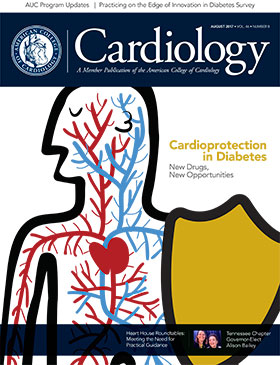From the Starting Line: Diabetes, Heart Health and the Early Career Physician
Each spring I visit the home of a middle-aged family friend. She has type 2 diabetes and a body mass index that hovers between overweight and obese. Each visit follows a similar pattern. We drink tea, she talks and I listen to a synopsis of her annual blood sugar control, diabetes medication changes and her concerns regarding the potential long-term effects of diabetes on her health. At our most recent visit, she had lost weight and looked fit. She proudly informed me of her new early morning walking routine. This lifestyle intervention improved her body weight, energy levels and blood sugar control. Consequently, she was ecstatic. Regular exercise would help reduce her risk for cardiovascular disease.
In our world of cardiovascular medicine, we often see patients with heart disease and diabetes. The Centers for Disease Control and Prevention estimates that 29.1 million people in the United States (9.3 percent of the U.S. population) have diabetes.1 Data from the 2007 – 2012 National Health and Nutrition Examination Survey show that the prevalence of metabolic syndrome in the U.S. adult population is on the rise.2 Both metabolic syndrome and diabetes are risk factors for cardiovascular disease.3,4 Mortality rates are higher in patients with diabetes compared with patients without diabetes.5,6 Patients with diabetes have a significant decrease in cardiovascular disease-free life expectancy.6
Early career physicians play an essential role in reducing the effect of diabetes on cardiovascular health.
Some patients will be entrusted into our care for several years. Given the detrimental effects of diabetes on cardiovascular health and life expectancy, therapies and interventions which improve cardiovascular health in patients with diabetes are invaluable. Lifestyle modification, appropriate blood pressure control and lipid management are recommended.7,8 Excitingly, new medications with cardiovascular benefit have emerged for patients with type 2 diabetes. Empagliflozin, a sodium-glucose co-transporter 2 inhibitor, has been shown to reduce the composite of cardiovascular death and all-cause mortality, when added to standard care.9 Canagliflozin demonstrated a reduction in cardiovascular risk, albeit with an increased risk of foot and leg amputations.10 The glucagon-like peptide 1 receptor agonists liraglutide and semaglutide also have demonstrated cardiovascular benefits in patients with type 2 diabetes.11,12
Early career physicians might occasionally find it challenging to stay abreast of advances in the management of diabetes. The ACC has developed numerous resources to assist physicians with this hurdle. ACC members have access to online educational resources including journal scans, patient case quizzes and guideline updates via the Diabetes and Cardiometabolic Clinical Topic Collection. Additionally, the ACC created the Diabetes Collaborative Registry as part of its quality improvement endeavors. The Diabetes Collaborative Registry, a global, cross-specialty clinical registry, provides physicians with data on national benchmarks, quality of care rendered by individual providers, opportunities for improved care and data for clinical research. ACC members interested in diabetes and its effects on cardiovascular health can network with each other via the Diabetes and Cardiometabolic Syndrome Work Group of the Prevention of Cardiovascular Disease Section.
Early career physicians play an essential role in reducing the effect of diabetes on cardiovascular health. We may not drink tea with our patients, but we listen to their stories, review their labs and medications, discuss lifestyle modification measures, communicate with other relevant members of the diabetes health care team and participate in pertinent registries and research. Together, we are multi-specialty partners in the fight for improved heart health.
Tweet this article: Tweet

Tweet this article: Tweet
References
- Centers for Disease Control and Prevention. 2014 National Diabetes Statistics Report. Available here. Accessed August 1, 2017.
- Moore JX, Chaudhary N, Akinyemiju T. Prev Chronic Dis 2017;14:E24.
- Mottillo S, Filion KB, Genest J, et al. J Am Coll Cardiol 2010;56:1113-32.
- Fox CS, Golden SH, Anderson C, et al. Circulation 2015;132:691-718.
- Preis SR, Hwang SJ, Coady S, et al. Circulation 2009;119:1728-35.
- Franco OH, Steverberg EW, Hu FB, et al. Arch Intern Med 2007;167:1145-51.
- Lloyd-Jones DM, Hong Y, Labarthe D, et al. Circulation 2010;121:586-613.
- Stone NJ, Robinson JG, Lichtenstein AH, et al. J Am Coll Cardiol 2014 63:2889-934.
- Zinman B, Wanner C, Lachin JM, et al. N Engl J Med 2015;373:2117-28.
- Neal B, Perkovic V, Mahaffey KW, et al. N Engl J Med 2017;Jun 12:[Epub ahead of print].
- Marso SP, Daniels GH, Brown-Frandsen K, et al. N Engl J Med 2016;375:311-22.
- Marso SP, Bain SC, Consoli A, et al. N Engl J Med 2016;375:1834-44.
 |
|
| Click the cover image above to read the latest issue of Cardiology in e-pub format or click here to read it on the web! | |
Clinical Topics: Cardiovascular Care Team, Diabetes and Cardiometabolic Disease, Prevention, Exercise
Keywords: ACC Publications, Cardiology Magazine, United States, Metabolic Syndrome, Blood Glucose, Diabetes Mellitus, Type 2, Risk Factors, Sodium, Cardiovascular Diseases, Prevalence, Walking, Life Expectancy, Benchmarking, Body Mass Index, Quality Improvement, Blood Pressure, Obesity, Glucosides, Life Style, Centers for Disease Control and Prevention, U.S., Heart Diseases, Registries, Patient Care Team, Amputation
< Back to Listings


